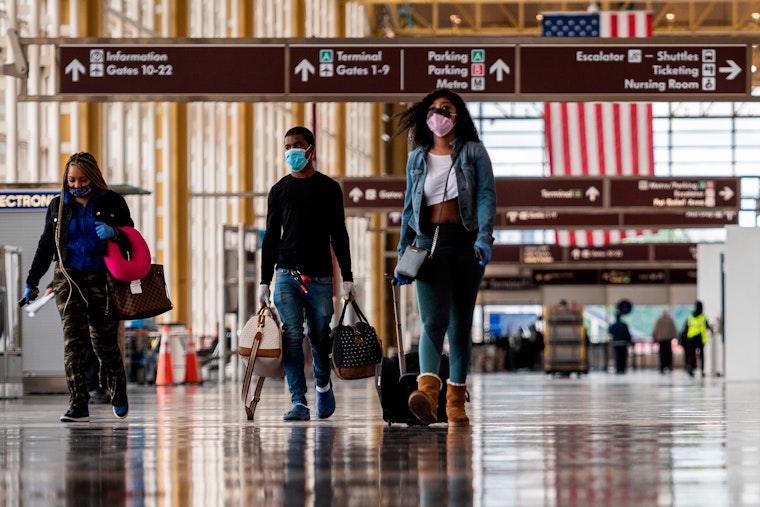Why Airline Bailouts Must Come with Carbon Emissions Reductions
By Kelsey Feehan

Back in March, as the U.S. Congress debated a recovery plan for the impending economic crisis brought by COVID-19, eight Democratic Senators voiced their concerns to congressional leadership that bailing out airline industries without requiring them to cut their carbon emissions would amount to a grave missed opportunity to tackle the climate crisis.
House Speaker Nancy Pelosi has also suggested that Congressional stimulus packages intended to boost the economy should help reduce emissions, rather than drive them upwards. Republicans, on the other hand, have notoriously abdicated responsibility over the climate crisis and it was unlikely better fuel standards would come under Mitch McConnell’s leadership in the Senate. Indeed, after nearly four months, Congress has passed one stimulus bill with a hefty airline recovery package included, and airline emissions reductions were nowhere to be found.
More and more, the American public understands the parallels between the climate crisis and coronavirus—and the government’s responsibility to act on science. Indeed, recent polling by Climate Nexus found that 6 in 10 Americans agree that the government should require airlines to reduce emissions if they receive recovery funds. After all, by injecting billions of dollars into a polluting industry that would likely otherwise fail, the U.S. government has gone from a passive regulator of emissions to an active participant, if not investor, in the airline industry.
In this, the U.S. is not alone. Every government around the world that is bailing out airlines has ramped up their obligation to lower the industry’s footprint. Yet, most have failed to live up to the challenge. The only bailout deal to come close is the French government’s requirement of Air France to halve its overall carbon emissions by 2030, halve its domestic flight emissions by 2024, renew its fleet with more efficient aircraft, and source 2% of its fuel requirements from sustainable sources by 2025. By contrast, the U.S. waived collection on jet fuel tax for both bailout recipients and non-recipients alike until 2021.
While U.S. airlines accepting bailout money from the $25 billion Payroll Support Program (PSP) are barred from laying off, involuntarily furloughing, or cutting pay for employees as a condition of funding, that prohibition ends October 1. Already, after a combined $16.2 billion in taxpayer funded pay roll support notwithstanding, executives at American, Delta, and United are declaring the inevitability of significant layoffs and pay cuts as soon as the prohibition ends.
Instead, history shows us that industry bailouts with environmental provisions can work, and have saved jobs, to boot. The Obama administration’s bridge loans to General Motors and Chrysler after the 2008 economic recession, which were approved under a House and Senate controlled by Democrats, required aggressive development of energy-efficient vehicles and the reduction of costs—fuel efficiency standards that Trump has since gutted. Between 2009 and 2012, the auto industry added 236,000 jobs. Congress’ $2.4 billion investment in increased advanced battery manufacturing, essential for advanced clean vehicles and a variety of clean-energy industries, also created tens of thousands of jobs according to Department of Energy estimates.
What makes this abandonment of obligation by the U.S. government particularly confounding is that the opportunity to stave off environmental destruction is closing. Leading climate scientists warn we have only a handful of years left to achieve the Intergovernmental Panel on Climate Change's recommendation to limit the rise in global temperatures by 1.5°C. Doing so will require unprecedented action on a size and scale that can meet the urgent and severe demands of the climate challenge.
While the global airline industry accounts for only 2% of all human-induced carbon emissions, that deceptively small percentage amounts to around 915 million tons of CO2 emitted per year—the equivalent of over 105 million American homes’ energy use each year. What’s more, the industry’s emissions have metastasized by a whopping 70% since 2005, and are projected to rise by as much as 300% by 2050.
In such dire circumstances, every “little bit” counts, and a tailor-made moment to force the industry’s hand is unlikely to present itself again. Instead of recognizing their good fortune and seizing the day, our leaders are locking us into an emissions projection for years to come that is all but certain to push our vulnerable climate over the edge of no return.
The airline lobby is seeking $32 million more dollars in payroll support, giving the U.S. Congress another shot to listen to the American public and wrestle emissions reductions from some of the world’s most profitable polluters. Last week, the U.S. Treasury Department announced that American Airlines, Frontier Airlines, Hawaiian Airlines, SkyWest Airlines, and Spirit Airlines have agreed to loan terms and signed letters of intent to receive funds from the second $25 billion pot of airline money. The terms and amounts have not been disclosed and talks with other airlines are continuing, according to a statement from Treasury Secretary Steven Mnuchin.
Should Congress continue to bailout airline executives and shareholders over the American people and workers, it must, at the very least, do so without compounding our environmental crisis for decades to come.
Kelsey Feehan is a litigation fellow with the Open Society Justice Initiative, based in New York.
